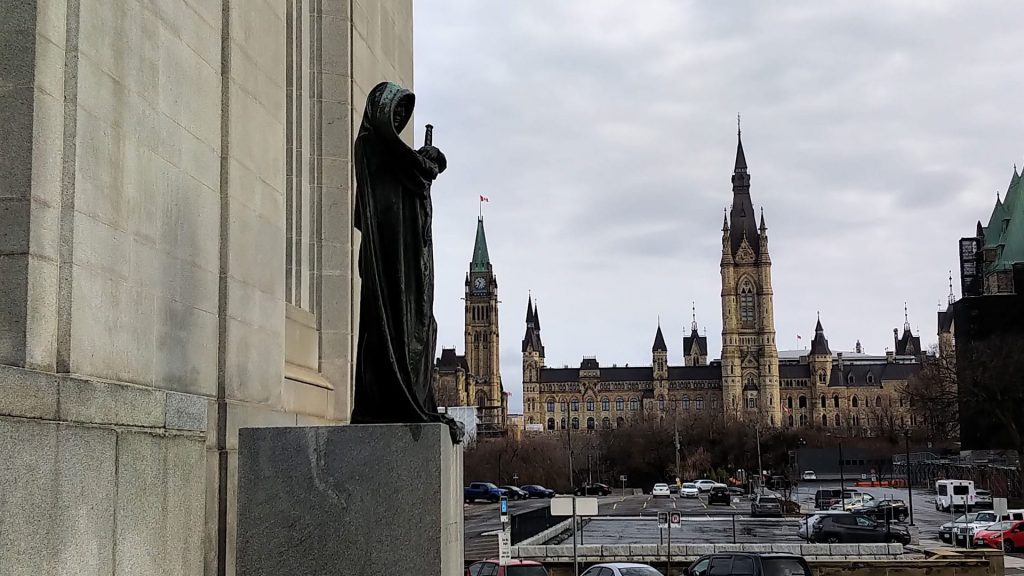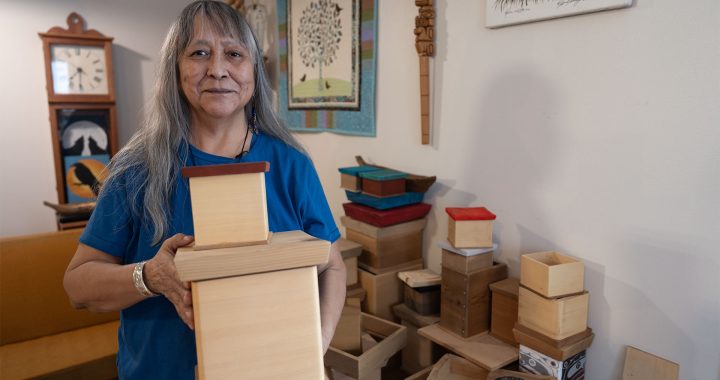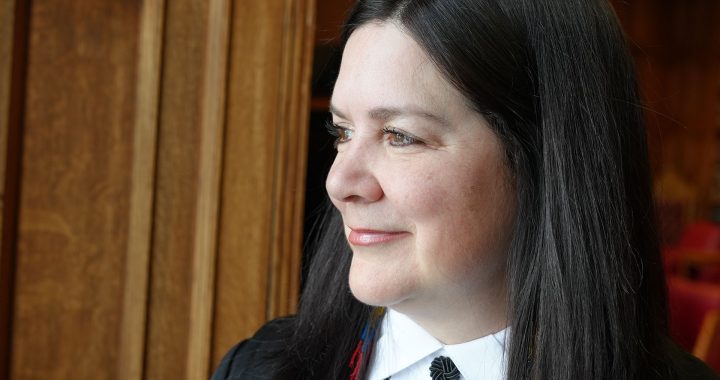
The Supreme Court of Canada says the federal law that gives control of child welfare services to First Nations, Inuit and Métis nations is constitutional.
In a unanimous decision released Friday, the court said the law “protects the well‑being of Indigenous children, youth and families by promoting the delivery of culturally appropriate child and family services and, in so doing, advances the process of reconciliation with Indigenous peoples.”
At nearly 100 pages, the court said that “nothing prevents Parliament from affirming that Indigenous peoples’ inherent right of self‑government recognized and affirmed by sec. 35 of the Constitution Act, 1982 includes legislative authority in relation to child and family services.”
The federal government passed Bill C-92 or An Act Respecting First Nations, Inuit and Métis children, youth and families in 2019 to give control of child welfare services to individual communities. It came into force on Jan. 1, 2020.
The main issue facing the court was whether the federal government was overstepping its powers by adding national standards to the law and two clauses – sec. 21 and 22(3) – C-92 that gives Indigenous communities the right to pass laws that will supersede provincial laws.
Read the decision here:
Affirming jurisdiction
The Supreme Court’s decision said the “overarching purpose has three elements: affirming Indigenous communities’ jurisdiction in relation to child and family services; establishing national standards applicable across Canada; and implementing aspects of the United Nations Declaration on the Rights of Indigenous Peoples [UNDRIP] in Canadian law.”
The case first went to the Supreme Court after Quebec challenged C-92 in its Court of Appeal in 2021, arguing the federal government overstepped its authority. On Feb. 10, 2022, the Quebec Court of Appeal ruled that on the whole, C-92 is constitutional, but said sec. 21 and 22 (3), the sections that give Indigenous community’s laws power, infringe on Quebec’s rights as a province.
Quebec appealed to the Supreme Court to have the entire law overturned. At the two-day hearing beginning Dec. 7, 2022, Quebec argued that C-92 “goes against federalism” and is “undermining the efforts of the provinces in matters of reconciliation with Indigenous peoples.”
It said provinces, not the federal government, are responsible for child welfare laws, and no law, other than a federal law, can override Quebec statutes.
Lawyers for Quebec accused the federal government of trying to “modify” sec. 35 of the Constitution of 1982 that guarantees Aboriginal rights without properly going through the process of making a constitutional amendment.
But in its 84-page brief, Canada argued that C-92 marked an “important step towards reconciliation with Indigenous peoples” because it was “developed in collaboration with Indigenous partners and representatives of the provinces and territories.”
The goal of the law, Canada added, was to address the “critical issue of over-representation of Indigenous children in child and family services (child services) systems while recognizing that Indigenous communities are best placed to identify and implement solutions to this issue.”
Canada argued that sec. 91 (24) of the Constitution of 1867 gives “legislative authority” to Parliament and extends power over a number of areas including “Indians, and lands reserved for the Indians.”
“These provisions clearly fall under the federal authority set out in subsection 91(24) of the Constitution Act, 1867 (CA 1867), since they concern relationships within Indigenous families and communities and aim to ensure the survival of Indigenous peoples’ distinctive cultures and their Indigenous character,” the federal government argued.
The justices on the Supreme Court agreed and said the ability to hand Indigenous communities self-government powers in relation to child welfare services “falls within Parliament’s legislative jurisdiction over Indians, and Lands reserved for the Indians.”
The provinces, N.W.T. and Indigenous organizations
There were dozens of submissions to the Supreme Court, including from the Northwest Territories and the provinces of British Columbia, Alberta and Manitoba. Almost all pushed back against the two sections in C-92 that give Indigenous nations the power to override provincial or territorial laws.
In its submission, Manitoba – with the highest rate of Indigenous children in care in the country – said it understood the need for a law like C-92. It noted Peguis First Nation had already introduced legislation “exercising jurisdiction” over its child and family services, and other “Indigenous groups” had expressed interest in doing the same.
But like Quebec, Manitoba said the two sections of the Act in question would “alter” the Constitution “by removing the ability of the provinces to enact child and family services laws that take precedence over conflicting Indigenous laws …”
It also argued that “Indigenous self-government” and Aboriginal rights under sec. 35 of the Constitution have always been “subject to regulation by federal and provincial laws.”
Alberta said Canada was using sec. 91 of the Constitution to “expand the scope of sec. 35” rights. First, by giving Indigenous communities the “force of law” equivalent to federal laws, and, second, by asking provinces to “coordinate” with Indigenous governments, taking away authority provinces hold under the Constitution.
“By removing the ability of provincial legislation to prevail over Indigenous law relating to child and family services, sec. 21 and 22(3) have the effect of enlarging the self-government right under sec. 35(1) and significantly diminishing the authority of provincial governments under sec. 92,” Manitoba said.
While the Quebec Court of Appeal recognized UNDRIP, Alberta said the “aspirational principles” don’t override the Constitution.
The Supreme Court, however, disagreed with that take. It ruled that UNDRIP has been incorporated into Canada’s domestic law and C-92 was a response to the calls to action by the Truth and Reconciliation Commission.
“The Act establishes national standards and provides Indigenous peoples with effective control over their children’s welfare,” the court said. “In sec. 9 to 17, it sets out national standards and principles, which establish a normative framework for the provision of culturally appropriate child and family services that applies across the country. In sec. 8(a) and 18(1), it affirms that the inherent right of self‑government recognized and affirmed by sec. 35 of the Constitution Act, 1982 includes legislative authority in relation to Indigenous child and family services.”
British Columbia, which passed its own UNDRIP law, was the only province to say Indigenous Peoples have the “inherent right protected by sec. 35 of the Constitution Act, 1982 to make laws concerning their children and families.” It also agreed that national standards are a legitimate part of the legislation and constitutionally valid.
Finally, Northwest Territories agreed with the provinces. Unlike provinces that get their authority under sec. 92 and 93 of the Constitution, the N.W.T, Yukon and Nunavut get their powers under self-government agreements. In the N.W.T. it’s called the NWT Act.
N.W.T. argued that by “having the force of federal law, Indigenous laws become Federal enactments within the Northwest Territories and gain a power to change Northwest Territories laws that they would not otherwise have.
“This creates the potential to significantly alter the legislative authority of the Northwest Territories in relation to child and family services and the administration of its child and family service laws,” it added. “This could result in requiring the Government of the Northwest Territories to administer the Indigenous law.”
First Nations
According to the Assembly of First Nations (AFN), a lobby group that represents more than 600 First Nations in Canada and helped develop C-92, there are approximately 105 First Nations child welfare agencies across the country serving more than 500 communities.
These agencies are funded by Indigenous services and operate under provincial laws. The AFN said another 170 First Nations were not served by First Nations agencies but by mainstream provincial or territorial agencies operating under agreements between the federal and provincial governments.
The federal government came up with C-92 after the Canadian Human Rights Tribunal ruled in 2016 that it discriminated against First Nations children by knowingly underfunding services for them on reserve. In 2022, it settled two class-action lawsuits for $23 billion to compensate tens of thousands of children and families who lived on reserve and were victims of the discriminatory system.
The AFN took aim at Quebec and said that at an emergency meeting held by the federal government to address the crisis within the Indigenous child welfare system, “Quebec’s representatives were present and participated in the associated briefings with Canada, but failed to voice any reservations on the co-development of federal legislation in regards to First Nations child welfare.
“What Quebec fails to recognize,” the AFN added, “is that the federal-provincial divisions that the Crown has imposed on itself with respect to authority over the provision of child and family services are internal to itself and do not alter the basic structure of sovereign-First Nations relations.
The “108 First Nations, as a self-determining people, have never relinquished or voluntarily surrendered their rights over their children and families, despite the Crown’s assimilative efforts and discriminatory practices in the provision of child services.”










